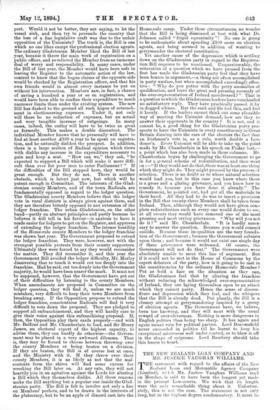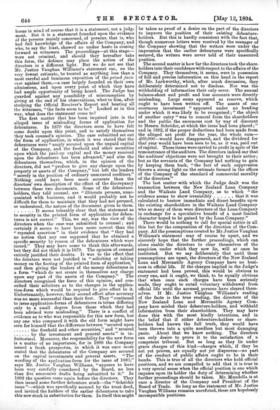THE NEW ZEALAND LOAN COMPANY AND MR. JUSTICE VAUGHAN WILLIAMS.
THE statement with regard to the affairs of the New Zealand Loan and Mercantile Agency Company (Limited), which Mr. Justice Vaughan Williams read on Monday, is said to have been the longest yet made in the present Law-courts. We wish that its length were the only remarkable thing about it. Unfortun- ately, this is not the case. The statement is not only long, but in the highest degree condemnatory. It must be borne in mind of course that it is a statement, not a judg- ment. But it is a statement founded upon the evidence of the persons mainly concerned, of persons, that is, who had full knowledge of the affairs of the Company, and who, to say the least, showed no undue haste in coming forward as witnesses. The proceedings—at this stage— were not criminal, and should they hereafter take this form, the defence may place the action of the directors in a different light. But we do not see that Mr. Justice Vaughan Williams's statement can, on the very lowest estimate, be treated as anything less than a most careful and luminous exposition of the prima facie case against them,—a case largely founded on their own admissions, and upon every point of which they have had ample opportunity of being heard. The Judge has guarded against any possibility of misconception by giving at the end of his observations, what to him, after studying the Official Receiver's Report and hearing all the witnesses, "the facts seem to be. Looked at in this way, what does the statement come to? The first matter that has been inquired into is the alleged issue of misleadina° forms of application for debentures. In 1879 the directors seem to have felt some doubt upon this point, and to satisfy themselves they took counsel's opinion. The case submitted set out the form of application, in which it was stated that the debentures were "amply secured upon the unpaid capital of the Company, and the freehold and other securities upon which the paid-up capital and the money received upon the debentures has been advanced," and also the debentures themselves, which, in the opinion of the directors, did not " profess to give any charge upon the property or assets of the Company," but left the lenders "merely in the position of ordinary unsecured creditors." Nothing could have been more accurate than the directors' own description of the effect of the discrepancy between these two documents. Some of the debenture- holders they told counsel, are "illiterate persons, unac- quainted with business, and it would probably not be difficult for them to maintain that they had not perused, or understood, the nature of the document given to them. It seems tolerably clear that the statement as to security in the printed form of application for deben- tures is not correct." This, we say, was the view of the directors when the case was submitted to counsel ; and certainly it seems to have been more correct than the "repeated assertion" in their evidence that "they had no notion that any one supposed that he obtained a specific security by reason of the debentures which were issued." They may have come to think this afterwards, but they did not think it in 1879. The opinion of counsel entirely justified their doubts. It was to the effect that the directors were not justified in "soliciting or taking money on the footing of the printed form of application, and then giving the lenders of the money debentures in a form "which do not create in themselves any charge upon any part of the assets of the Company.' The directors recognised the force of this opinion, and con- sulted their solicitors as to the changes in the applica- tion-form which would be required to give effect to it. Unfortunately, however, their second effort after accuracy was no more successful than their first. They "continued to issue application-forms of debentures in terms differing only to a small degree from those which they had been advised were misleading." There is a conflict of evidence as to who was responsible for this new form, but any one who compared it with the old form might have seen for himself that the difference between "secured upon the freehold and other securities," and "secured by the investment and general assets" is in- finitesimal. Moreover, the responsibility for the new form is a matter of no importance, for in 1888 the Company issued a fresh prospectus, in which it was once more stated, that the debentures of the Company are secured on the capital investments and general assets. "The wording Of the application-form for the issue of 1889," says Mr. Justice Vaughan Williams, "appears to have been very carefully considered by the Board, no less than five successive drafts being submitted to it." In 1892 the question came again before the directors. They then issued some further debenture stock—the "Schroder issue "—which was specifically secured by the trust deed, and invited the holders of the earlier debentures to take this new stock in substitution for them. In itself this might be taken as proof of a desire on the part of the directors to improve the position of their existing debenture holders. But this is hardly consistent with the fact that, though numerous letters were received by the manager of the Company showing that the writers were under the impression that the earlier debentures were specifically secured, the writers were never told of their unsecured position.
The second matter is how far the directors took the share- holders into their confidence with respect to the affairs of the Company. They themselves, it seems, were in possession of full and precise information on this head in the report of Mr. Larkworthy, which, after much discussion, they deliberately determined not to disclose. Nor was the withholding of information their only error. The annual balance-sheet and profit and loss accounts were directly misleading. Large sums appeared as reserve, which ought to have been written off. The assets of one enormous investment " appeared under no heading under which it was likely to be recognised ; " the object of another entry "was to conceal from the shareholders and the public the enormous cost by way of discount to Messrs. Schroder, at which the issue had been placed;" and in 1892, if the proper deductions had been made from the alleged net profit for the year, the whole sum- £69,000—would have disappeared, and the dividend for that year would have been seen to be, as it was, paid out of capital. These items were carried to profit in spite of the remonstrance of the auditors. The directors indeed say that the auditors' objections were not brought to their notice ; but as the servants of the Company had nothing to gain by keeping them back, "the fact of such suppression throws a strong light on the estimate formed in the offices of the Company of the standard of commercial morality of the directors."
The last matter with which the Judge dealt was the transaction between the New Zealand Loan Company and the Waikato Land Company, as to which "the evidence seems to show irresistibly that it was calculated to bestow immediate and direct benefits upon the existing shareholders in the Waikato Land Company who so many of them were directors of the Loan Company in exchange for a speculative benefit of a most limited character hoped to be gained by the Loan Company." There would be nothing to call for special notice in all this but for the composition of the direction of the Com- pany. All the presumptions created by Mr. Justice Vaughan Williams's statement may of course be upset, and we sincerely hope that the further proceedings, which can alone enable the directors to clear themselves of the suspicion under which they now lie, will at once be instituted. But we say deliberately that until these presumptions are upset, the directors of the New Zealand Loan and Mercantile Agency Company have no busi- ness in official life. If the charges implied in the Judge's statement had been proved, this would be obvious to every one, and it ought, we think, to be equally obvious that. when once such charges have been seriously made, they ought to entail voluntary withdrawal from official life until the accused,persons have cleared them- selves. If Mr. Justice Vitukhan Williams's reading of the facts is the true reading, the directors of the New Zealand Loan and Mercantile Agency Com- pany have misled their debenture-holders, and withheld information from their shareholders. They may have done this with the most kindly intentions, and in the belief that if either debenture-holders or share- holders had known the full truth, they would have been thrown into a quite needless but most damaging panic. About that we know nothing. The directors can only desire to prove it to the satisfaction of a competent tribunal. But so long as they lie under grave charges of this kind—charges which, if they be not yet proven, are equally not yet disproven—no part of the conduct of public affairs ought to be in their hands. This is true of all the directors who hold official positions, and we are compelled to add that it is true in a very special sense when the official position is one which imposes upon its holder the duty of determining whether further proceedings should be taken. Mr. Mundell& is at once a director of the Company and President of the Board of Trade. So long as the statement of Mr. Justice Vaughan Williams remains unrefuted, these are hopelessly incompatible positions.



































 Previous page
Previous page